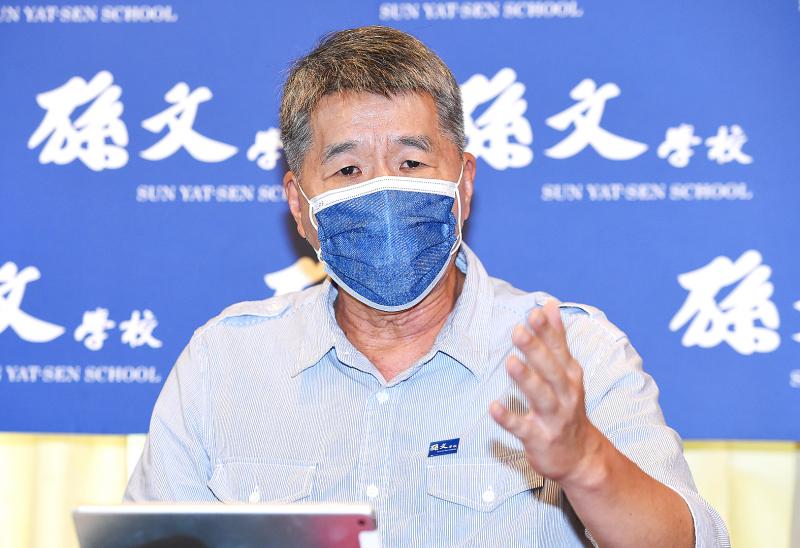The Chinese Nationalist Party’s (KMT) election supervisory body yesterday revoked a controversial decision to refer KMT chair candidate Chang Ya-chung (張亞中) to the party’s disciplinary committee.
Chang, whose popularity rose after a televised debate on Sept. 4, is one of four candidates in the KMT’s chair election to take place on Saturday next week.
The other candidates are former Changhua County commissioner Cho Po-yuan (卓伯源), incumbent KMT Chairman Johnny Chiang (江啟臣) and former New Taipei City mayor Eric Chu (朱立倫), who was KMT chairman from January 2015 to January 2016.

Photo: Liao Chen-huei, Taipei Times
The KMT Central Election Supervision Committee at a meeting on Monday decided to refer Chang, who is president of Sun Yat-sen School, to the party’s Central Evaluation and Disciplinary Committee, citing what it described as Chang’s repeated verbal attacks against Chu during the campaign.
The election committee also said that it would postpone a series of regional platform presentations for the candidates until after the disciplinary committee had ruled on the matter.
Chiang on Monday said that he was surprised by the election committee’s decision and urged its members to reconsider.
New Taipei City Councilor Chen Ming-yi (陳明義), who represents Chiang on the election committee, was not at the meeting when the decision was made, Chiang said.
The election committee’s decision two weeks before the vote would not help to resolve issues within the KMT and could lead to controversy, he said.
Chu later on Monday said that he hoped the disciplinary committee would not penalize Chang, and called on Chiang and the KMT Central Standing Committee to “revoke the order” to refer Chang to the disciplinary committee.
Chiang responded by saying that on Aug. 17 he took a leave of absence from his position as KMT chairman to campaign for re-election and therefore he has no say over party affairs.
Whereas Chen did not attend the election committee meeting, Chu’s representative, Yao Chiang-lin (姚江臨) did, Chiang said.
The election committee met yesterday and approved a proposal from Chen to rescind both the decision to refer Chang to the disciplinary committee and to postpone the regional platform presentations, the KMT said.
Chang in a statement later yesterday said that the controversy had caused people to question the neutrality of the party’s election officials.
The KMT should clear up the doubts of the candidates, party members and public, by issuing an explanation and holding those involved responsible, he said.
Additional reporting by CNA

The Grand Hotel Taipei on Saturday confirmed that its information system had been illegally accessed and expressed its deepest apologies for the concern it has caused its customers, adding that the issue is being investigated by the Ministry of Justice Investigation Bureau. The hotel said that on Tuesday last week, it had discovered an external illegal intrusion into its information system. An initial digital forensic investigation confirmed that parts of the system had been accessed, it said, adding that the possibility that some customer data were stolen and leaked could not be ruled out. The actual scope and content of the affected data

DO THEY BITE IT? Cats have better memories than people might think, but their motivation is based entirely around the chance of getting fed Cats can remember the identity of the people who fed them the day before, Taipei-based veterinarians said on Friday, debunking a popular myth that cats have a short memory. If a stray does not recognize the person who fed them the previous day, it is likely because they are not carrying food and the cat has no reason to recognize them, said Wu Chou Animal Hospital head Chen Chen-huan (陳震寰). “When cats come to a human bearing food, it is coming for the food, not the person,” he said. “The food is the key.” Since the cat’s attention is on the food, it

‘LIKE-MINDED PARTNER’: Tako van Popta said it would be inappropriate to delay signing the deal with Taiwan because of China, adding he would promote the issue Canadian senators have stressed Taiwan’s importance for international trade and expressed enthusiasm for ensuring the Taiwan-Canada trade cooperation framework agreement is implemented this year. Representative to Canada Harry Tseng (曾厚仁) in an interview with the Central News Agency (CNA) said he was increasingly uneasy about Ottawa’s delays in signing the agreement, especially as Ottawa has warmed toward Beijing. There are “no negotiations left. Not only [is it] initialed, we have three versions of the text ready: English, French and Mandarin,” Tseng said. “That tells you how close we are to the final signature.” Tseng said that he hoped Canadian Prime Minister Mark Carney

President William Lai (賴清德) yesterday bestowed one of Taiwan’s highest honors on Saint Vincent and the Grenadines (SVG) Ambassador Andrea Clare Bowman in recognition of her contributions to bilateral ties. “By conferring the Order of Brilliant Star with Grand Cordon on Ambassador Bowman today, I want to sincerely thank her, on behalf of the Taiwanese people, for her outstanding contribution to deepening diplomatic ties between Taiwan and SVG,” Lai said at a ceremony held at the Presidential Office in Taipei. He noted that Bowman became SVG’s first ambassador to Taiwan in 2019 and